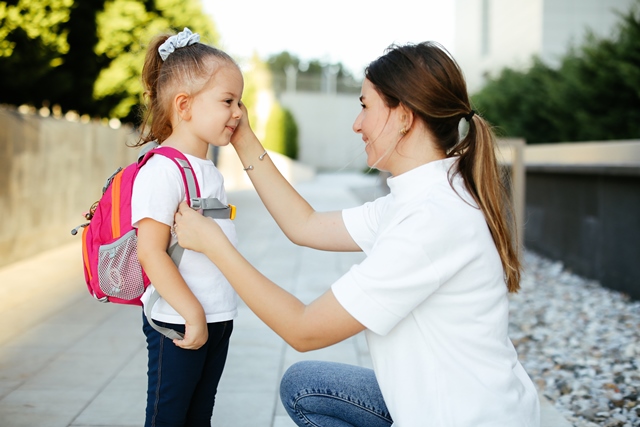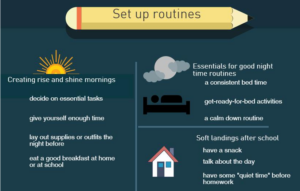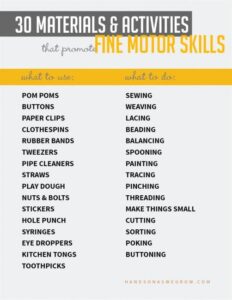School days are here today! Kids in Dayton and across the country are packing their backpacks and getting ready to be back in the classroom. For new kindergarteners and their parents, this can be a big new adjustment.
Kindergarten readiness can feel like a lot of pressure for parents, but we’re here to ease your mind. No child is perfectly prepared for the transition — that’s the whole point of school! They quickly learn, grow, and adjust to their new environment with the help of their parents and teachers alike.
Whether you have a child entering kindergarten this year or one who will enter in the near future, we’ve prepared a list of tips and activities to help you prepare and have fun while you’re at it! Here’s our list of 15 kindergarten readiness tips (plus a bonus reminder that parent readiness is important, too!).
Quick Takeaways
- It’s not just academics! Parents can help their children prepare for kindergarten socially, emotionally, and physically, too.
- Children learn and grow at different paces, and parents shouldn’t feel pressured to create a perfect level of readiness for kindergarten.
- Engaging in activities that prepare your child for kindergarten can be a fun opportunity for parent-child bonding.
- It’s important to prioritize parent wellbeing, too, as your child prepares for school.
Social and Emotional Readiness
According to Ohio’s own Mayo Clinic, the most important role a parent plays in creating kindergarten readiness for their children is in providing a safe, healthy childhood environment in which they can grow and thrive.
Children hit milestones at all different stages, and no child will enter kindergarten perfectly prepared for school with no hiccups along the way. The priority for parents should be to provide the unique support their child needs. There are some specific areas parents can work on with children to help them feel ready for kindergarten and take on the adjustments that come with a new school environment.
Independence
For many children, kindergarten is the first time they will experience being away from their parents for a full school day five days a week. This is a big adjustment for kids and parents alike! But how can you prepare them for this while they’re still at home?
Parents.com offers several great tips for school-related separation anxiety, but we’ll summarize the important takeaways:
- Talk about it – Let your child know what to expect by talking about their new routine well in advance.
- Visit their school (if you can) – Build familiarity with your child’s new environment by taking them for a visit before their big first day.
- Stay positive – Separation can be hard on parents, too, but it’s important not to share that stress with your child. Always talk about school with a positive mindset.
Routines
As adults we’re already used to waking up in the morning, preparing for a busy day, and leaving home for work and whatever other activities the day entails. For kindergarteners, this can be a lot to take on without some practice.
It’s a good idea to get into a routine before school begins by setting bedtimes, getting up and eating breakfast on time, and getting dressed and ready to leave the house on the same schedule your child will follow for kindergarten. This way, the new routine doesn’t add stress to the start of the school year.
Following Directions
Your child may not be used to following directions to the same extent they’ll have to do it in a classroom. There’s a certain level of flexibility that comes with being at home, and much of that has to do with the familiarity and comfort children have with their parents.
Talk about the concept of following directions. Then, have your child practice following the kinds of directions kids receive in kindergarten (like staying in their seat, cleaning up after play, and sitting down to eat) to better prepare them for the classroom environment.
Sharing
Even children with siblings and who are accustomed to playing with other children can have a hard time sharing in the classroom. There are new, novel toys and many more children in a kindergarten class than a playdate with friends. It’s important to practice sharing in general, but also talk to your child about the stricter sharing expectations they may encounter at school.
Structured Play
Play is more structured in a kindergarten classroom for good reason. It helps create small-group and independent play opportunities and maintains a controlled, calm environment for children. But it can be a new concept for children who may be used to moving to different toys and activities with full freedom at home.
You can practice structured play by offering controlled choice (giving your child specific options to choose from) and by sticking with one activity for a set period of time before moving on to another.
Conflict Resolution
Kindergarteners certainly won’t be perfect at resolving conflicts (us adults aren’t either!) but they should be comfortable talking with children in social situations and solving simple problems that arise in play. This often happens naturally at playdates and in interactions with siblings. Parents shouldn’t feel pressured to create perfect problem solvers, but it’s good to keep an eye on your child’s ability to work through age-appropriate issues.
Self-Regulation
Along with their new environment, children will encounter many new emotions as they navigate being a school student. Parents can help their children feel prepared to deal with these emotions by teaching them simple coping techniques like deep breathing, counting to ten, and of course, talking with their teacher or a trusted adult when they feel overwhelmed. Most of all, it’s important that kids understand it’s okay to feel emotional, and that they have support.
Physical and Fine Motor Skills
Children entering kindergarten will engage in new indoor and outdoor activities that require fine and gross motor skills. Kids develop these naturally in many ways, but at home, parents can practice some specific skills that their children will definitely use in kindergarten.
Using Writing Instruments
Practice using different kinds of writing instruments like pencils, markers, and crayons that kids will use in the classroom.
Outdoor Play
During outdoor play in kindergarten, kids engage in activities that challenge their gross motor skills, like throwing a ball or navigating playground equipment. These are things you can definitely work on at home so that kids feel excited to engage when they get to school. It helps that this is an opportunity for some fun bonding time, too! Simple activities like playing catch and working on some of the tougher playground equipment such as monkey bars and ladders will have your child ready to jump right in at recess.
Handling Objects
Sensory play is an important part of the kindergarten experience. Children may get to work with texture materials like water and sand, and use objects like shovels, funnels, and more to manipulate it. It’s certainly not a must-do, but practicing these kinds of activities can also be fun at home and create familiarity with the idea for school.
Here are some other fun ideas for objects and materials you can use to practice fine motor skills:
Using Art Supplies
In addition to writing instruments, kids will have art supplies like scissors, glue, and paintbrushes during art class. It’s helpful if they have some experience with these supplies before they get to the classroom.
Academics
Kindergarten is usually a child’s first foray into full-time academic education. That said, kids learn quickly and kindergarten teachers are trained to help children learn and develop as they are able at school. As a parent, it’s important not to feel overly stressed about your child’s academic abilities before they enter kindergarten. That said, it is a great idea to start out with some foundational concepts, many of which you’ll just be reinforcing from preschool.
Writing Their Name
One of the first things your child will learn to do in kindergarten is write their name. You can make this fun at home by helping them learn to spell their name verbally, writing letters they can trace as they learn to write it, and then helping them begin to write it out on their own.
Recognizing Letters
Children in kindergarten will be immersed in learning to read and write, and you can help them get a head start by practicing letter recognition at home. Don’t worry if they don’t have it down perfectly — recognizing some letters of the alphabet before they get to school is a great start!
Counting
Counting is another activity that’s easily made fun. Sing songs, watch videos, and count objects your kids play with at home. Before you know it, they’ll be counting to ten and beyond! Here’s a fun one from Kids Academy you can try:
Learn Numbers Up to 20 for Preschool and Kindergarten (video)
Personal Information
It’s a good idea for a lot of reasons for kids to know some basic personal information, including their name, phone number, address, and birthday. We love these ideas to make this fun by drawing a neighborhood map, creating flashcards, and singing songs to help with memorization.
Parent Preparation
The more prepared you are as a parent for your child to enter kindergarten, the better you’ll be able to support them. Be sure to prioritize your wellbeing and emotionally prepare to send your child to school.
Planning ahead, talking with your partner or trusted friends, and creating special routines and traditions to stay connected to your child are all ways to ease the transition for you, too.
Moving to the Dayton area? Oberer Homes can help you find the family home of your dreams. Contact us today to learn more!
Share this Post


